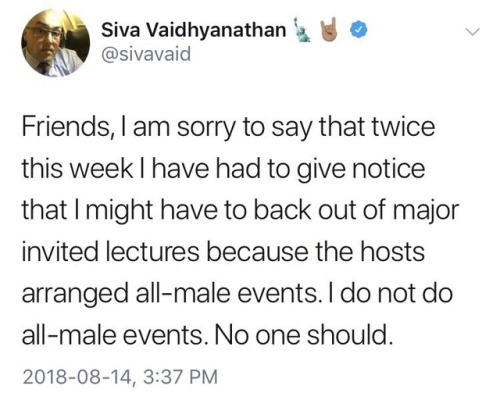Ship-happenss - S H I P H A P P E N S

More Posts from Ship-happenss and Others

Stephen Hawking, January 8, 1942 - March 14, 2018
Born 300 years to the day after Galileo died
Died on Albert Einstein’s birthday
March 14: Annual Pi day (π)
“Life would be tragic if it weren’t funny” - S.H.


Addressing gender imbalance in academic work

“MOON DRIVE”
Actual advice on how to study for engineering courses from a first year student
Okay so I just finished my first semester in university and lets just say I’ve got to change my whole learning/studying style to be able to survive here. Here are some of the things I’ve learnt to do and will be doing in second semester:
1. Start backwards:

I highschool, you try to learn the subject by going to class, listening to the teacher, then going home, reading the textbook, then doing the homework, then making notes, then studying for the final. In engineering, you have to do this backwards: You will realize that you are going to be basically teaching yourself the content one way or another soon before the finals, so better start now. First, go through the past exams and past papers - make a list of all the major topics covered (example: if in an electrical circuits course, a question on a past final exam is “find the equivalent circuit using thevenin’s theorem” then write Thevenin’s theorem as a topic to be learned). Then go on youtube and find videos that explain each of these topics to you and make rough notes on these topics. (Reblog if you want me to make a master list of all the youtubers that teach engineering really well). Then go through he textbook and find sample questions not he theorem/topic you learnt off of youtube, and solve them. Then write your doubts in a notebook. Then go to class and have two notebooks open : one where you are taking notes of what the prof is saying, and one which has your practice problems solved, and see if the prof clarifies your doubts in the lecture. The lecture should be review of what you learnt at home!!!! Then, after class go to the prof and clarify any doubts. Then go home and make final notes on the topic. I like to make notes on cue cards (more on this later). Then go back to the final exam and see if you can solve the problem.
2. Make cue cards:

I like to get index cards and write a short note on how to solve each type of question I am likely to see on a final exam on each question card. Example: one cue card for “how to find resistance using wheatstone bridge” . I link the cue cards with a clip and its easier to carry the around and study.
3. Get pretty notebooks and organize your stationary. Its easier to stay focused when everything is pretty.

What the MBTI types remind me of
ISFJ: Newbaked cookies.
ESFJ: The sunshine warming my cheek.
ISFP: Playing guitar on the grass in a little park.
ESFP: Long nights filled with laughter and dance.
ISTP: Motorcycles. (Vroom vroom)
ESTP: Skydiving and mountain climbing.
ISTJ: Notebooks filled with structured, aesthetic writing.
ESTJ: A tidy office in a fancy New York office building.
INFJ: Old vintage clocks ticking slowly and quietly.
ENFJ: Watching the sunset wrapped in a cozy blanket.
INFP: The scent of freshly baked cinnamon buns.
ENFP: Waking up in a new apartment, ready for the first day at my new job.
INTP: Sleepless nights working simply to gain knowledge.
ENTP: The feeling of winning a fact based argument.
INTJ: Focusing hard whilst playing a game of chess.
ENTJ: Getting into a taxi headed for work, checking the time impatiently.
my dad just exploded into laughter out of nowhere and told me ‘imagine the lion king but with sea lions’ he has been chuckling about it for 5 straight minutes now

INTJ Relationship goals

By: Brian | brianmcw
Love the b/w anatomical print

Boss lady 😎


— vincent van gogh
-
 talissa-leal liked this · 5 months ago
talissa-leal liked this · 5 months ago -
 talissa-leal reblogged this · 5 months ago
talissa-leal reblogged this · 5 months ago -
 descrevos reblogged this · 5 months ago
descrevos reblogged this · 5 months ago -
 n3v3r3v3rrr reblogged this · 7 months ago
n3v3r3v3rrr reblogged this · 7 months ago -
 jessyjustdream reblogged this · 8 months ago
jessyjustdream reblogged this · 8 months ago -
 jessyjustdream liked this · 9 months ago
jessyjustdream liked this · 9 months ago -
 harmonizeorelse liked this · 1 year ago
harmonizeorelse liked this · 1 year ago -
 if-we-die-we-die-cool liked this · 1 year ago
if-we-die-we-die-cool liked this · 1 year ago -
 if-we-die-we-die-cool reblogged this · 1 year ago
if-we-die-we-die-cool reblogged this · 1 year ago -
 boja-hladnog-srebra liked this · 1 year ago
boja-hladnog-srebra liked this · 1 year ago -
 100newts reblogged this · 1 year ago
100newts reblogged this · 1 year ago -
 prettylikevenus liked this · 1 year ago
prettylikevenus liked this · 1 year ago -
 getmetothesnow liked this · 1 year ago
getmetothesnow liked this · 1 year ago -
 stylinonthesebitches reblogged this · 1 year ago
stylinonthesebitches reblogged this · 1 year ago -
 damn-funny reblogged this · 1 year ago
damn-funny reblogged this · 1 year ago -
 thatfunnyguy reblogged this · 1 year ago
thatfunnyguy reblogged this · 1 year ago -
 black6mirror reblogged this · 1 year ago
black6mirror reblogged this · 1 year ago -
 roszpunka2106 liked this · 1 year ago
roszpunka2106 liked this · 1 year ago -
 mywazowski liked this · 1 year ago
mywazowski liked this · 1 year ago -
 un-diavolo-con-le-ali reblogged this · 1 year ago
un-diavolo-con-le-ali reblogged this · 1 year ago -
 sublimehumanpersonplaid liked this · 1 year ago
sublimehumanpersonplaid liked this · 1 year ago -
 thoughtful-eso reblogged this · 1 year ago
thoughtful-eso reblogged this · 1 year ago -
 thoughtful-eso liked this · 1 year ago
thoughtful-eso liked this · 1 year ago -
 maya-the-siren liked this · 1 year ago
maya-the-siren liked this · 1 year ago -
 yedre reblogged this · 1 year ago
yedre reblogged this · 1 year ago -
 yedre liked this · 1 year ago
yedre liked this · 1 year ago -
 hissiz1beden liked this · 1 year ago
hissiz1beden liked this · 1 year ago -
 parakazangerisiyalan liked this · 1 year ago
parakazangerisiyalan liked this · 1 year ago -
 ornitorenkbakicisi reblogged this · 1 year ago
ornitorenkbakicisi reblogged this · 1 year ago -
 pimentopianist reblogged this · 1 year ago
pimentopianist reblogged this · 1 year ago -
 ruhumdakisaklicennet reblogged this · 1 year ago
ruhumdakisaklicennet reblogged this · 1 year ago -
 kafaminguzelligi reblogged this · 1 year ago
kafaminguzelligi reblogged this · 1 year ago -
 ghostbabypixels liked this · 1 year ago
ghostbabypixels liked this · 1 year ago -
 madalin137 liked this · 1 year ago
madalin137 liked this · 1 year ago -
 sadinjuly liked this · 1 year ago
sadinjuly liked this · 1 year ago -
 verpanobud liked this · 1 year ago
verpanobud liked this · 1 year ago -
 the-ways-of-life liked this · 1 year ago
the-ways-of-life liked this · 1 year ago -
 overrcastt reblogged this · 1 year ago
overrcastt reblogged this · 1 year ago